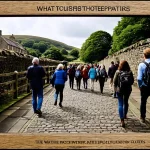Key Developments Shaping UK Tourism in 2023/2024
The UK tourism trends in 2023/2024 reflect notable shifts driven by both external factors and industry innovations. Recent travel sector changes are largely influenced by global economic fluctuations and evolving traveler preferences. Travelers now prioritize sustainable tourism and authentic experiences, shaping how destinations market themselves.
Technological advancements have transformed the tourism industry updates, promoting seamless booking, personalized itineraries, and virtual previews of landmarks. Such digital integration enhances convenience and appeals to tech-savvy visitors.
Also to discover : What are the emerging trends in UK travel post-pandemic?
World events like ongoing geopolitical tensions and public health considerations continue to impact travel patterns. However, the UK’s diverse cultural offerings and natural attractions maintain strong appeal, drawing both domestic and international tourists. Insights into traveler motivations highlight a growing demand for flexible travel options, eco-friendly accommodations, and immersive cultural experiences.
Understanding these dynamics helps stakeholders anticipate future shifts and tailor services effectively. Adapting to these key developments is crucial for sustaining growth and competitiveness in the evolving UK tourism landscape.
In parallel : What Are the Most Recent Developments in UK Eco-Tourism?
Growth in Sustainable and Responsible Travel
Sustainable tourism is rapidly becoming a key priority for travelers and industry players alike. In the UK, responsible tourism has seen significant growth due to increasing demand for eco-friendly travel options. More travelers actively seek accommodations that employ green practices, such as energy-efficient lighting and water conservation initiatives. Similarly, transportation choices reflect this trend, with electric vehicles and low-emission public transit options favored over traditional models.
Destinations and businesses are responding by introducing comprehensive strategies to reduce environmental impact. This includes minimizing waste, supporting local communities, and preserving natural habitats. For instance, hotels might implement recycling programs and source food locally to reduce their carbon footprint.
Carbon offsetting has also gained traction as a way to neutralize emissions associated with travel. Sustainable tour operators now offer packages that balance exciting experiences with environmental responsibility, often incorporating educational elements about conservation.
By prioritizing sustainable tourism, travelers contribute positively to the planet while enjoying enriching experiences. Embracing responsible tourism in the UK ensures that the industry can thrive without compromising future generations’ ability to explore the world beautifully and sustainably.
Emergence of Domestic and Staycation Tourism
The rise in domestic tourism UK signals a shifting trend where more people opt for staycations, exploring the rich variety within their own country. Economic uncertainties and changing travel preferences have motivated travelers to prioritize convenience and affordability over international trips. Staycations not only reduce travel costs but also encourage sustainable tourism practices by minimizing carbon footprints.
Regions like the Lake District, Cornwall, and the Scottish Highlands have become hotspots for UK residents seeking scenic landscapes and cultural experiences. These destinations offer myriad activities, from hiking and coastal walks to historical tours, meeting diverse interests that fuel the popularity of domestic tourism UK.
The economic benefits of boosted domestic travel are significant. Local businesses such as hotels, restaurants, and attractions benefit directly, fostering regional growth. Socially, staycations reinforce community pride and connectivity, allowing residents to rediscover their heritage. The combination of these advantages makes staycations a compelling choice aligned with evolving UK travel preferences.
Integration of Advanced Technology in the Tourism Experience
Enhancing travel through innovation
The rise of travel technology UK has transformed how visitors engage with destinations. From the moment travelers plan their trips, digital innovation tourism plays a pivotal role. Apps powered by AI offer personalized recommendations, optimizing routes and highlighting hidden gems. Virtual reality previews allow tourists to explore landmarks virtually, boosting anticipation and informed decision-making.
In accommodations and transport, smart tourism brings convenience and safety with digital check-ins and contactless services. Mobile bookings have become standard, offering seamless transactions often tailored specifically for UK travelers, meeting their preferences for speed and security.
Online travel platforms focused on the UK market integrate these technologies to provide a unified, user-friendly experience. These platforms combine AI-driven suggestions with booking services, transforming travel logistics into a straightforward process.
Together, these advancements show how travel technology UK and smart tourism synergize to elevate every stage of the tourism experience—from planning to arrival—making trips smoother, safer, and more engaging than ever before.
Expansion of Experiential and Niche Travel
Experiential tourism is reshaping the travel landscape, especially in the UK, where unique travel experiences are increasingly in demand. Travelers now seek deeper cultural immersion, favoring activities that connect them authentically with local life. This shift reflects a preference for stories and emotions over mere sightseeing.
Niche tourism has grown to accommodate these desires, offering tailored options from food tourism to adventure travel and wellness retreats. For example, visitors may explore farm-to-table dining or join guided hikes in the Lake District, enriching their journey with meaningful encounters.
Festivals, art, and heritage play a crucial role in attracting new visitor segments who value creativity and history as part of their travel. Events like local music festivals or heritage walks not only entertain but foster a shared sense of community and identity. This synergy of art and culture enhances the appeal of experiential tourism in the UK, making it a vibrant and growing sector.
Responses to Post-Pandemic Changes in UK Tourism
The post-pandemic tourism landscape in the UK has notably shifted. Travelers now prioritize health and safety travel measures more than ever. This heightened awareness influences destination choices and accommodation preferences, with many seeking reassurance through visible cleanliness protocols and contactless services.
In response, UK tourism providers have implemented robust health and safety travel protocols. This includes enhanced sanitization, social distancing guidelines, and flexible booking policies that offer refunds or rescheduling. These changes address travelers’ concerns, making holiday planning less stressful and more adaptable to unforeseen circumstances.
To support UK tourism recovery, businesses have adopted targeted strategies. Marketing focuses on local attractions and outdoor activities to appeal to cautious travelers. Flexible pricing and promotions incentivize early bookings while maintaining safety standards. Destinations emphasize their commitment to well-being, boosting traveler confidence.
By integrating these measures, the UK tourism sector aims to rebuild trust and adapt to lasting shifts in traveler behaviour, ensuring resilience in a changing market environment. This approach reflects a thoughtful balance between safety and customer satisfaction critical for sustained recovery.
Data, Expert Insights, and What’s Next for UK Tourism
Recent tourism data UK reveals a notable shift in traveler profiles and preferences. Domestic tourism has surged as more UK residents explore their own country, favoring rural and coastal destinations over traditional city breaks. Experts attribute this to evolving attitudes toward sustainable and local travel experiences.
Industry leaders highlight that technological integration, such as AI-powered recommendations and contactless services, is reshaping the sector. According to various expert analysis, personalized travel planning and eco-friendly options are becoming key factors influencing visitor decisions.
Looking ahead, future travel trends UK indicate increased demand for immersive cultural experiences and wellness tourism, supported by smarter data analytics and enhanced connectivity. The sector is likely to embrace hybrid events and flexible booking policies, catering to a more cautious but adventurous traveler. This offers fresh opportunities for businesses to innovate and adapt, blending technology with authentic experiences to meet evolving expectations.
By focusing on these insights, the UK tourism industry can better anticipate changes and strategically unlock growth potential while responding to traveler demands.


